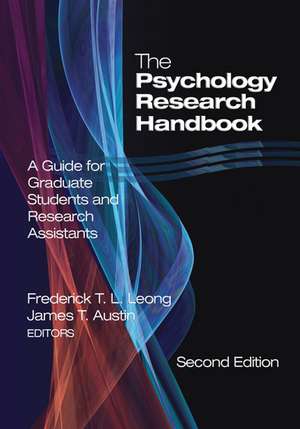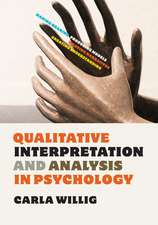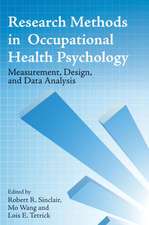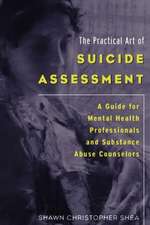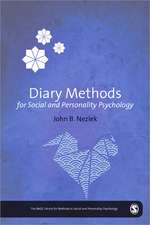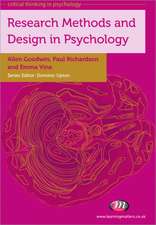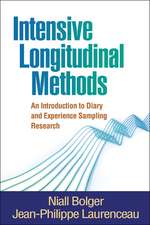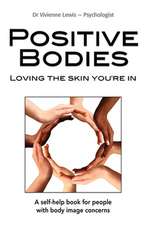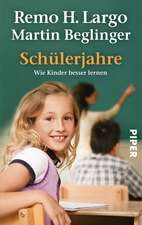The Psychology Research Handbook: A Guide for Graduate Students and Research Assistants
Autor Frederick Leong, James Austinen Limba Engleză Paperback – 28 noi 2005
| Toate formatele și edițiile | Preț | Express |
|---|---|---|
| Paperback (2) | 701.64 lei 22-36 zile | +46.62 lei 6-12 zile |
| Sage Publications, Inc – 16 ian 2024 | 701.64 lei 22-36 zile | +46.62 lei 6-12 zile |
| SAGE Publications – 28 noi 2005 | 995.99 lei 43-57 zile | |
| Hardback (1) | 1208.94 lei 43-57 zile | |
| SAGE Publications – 28 noi 2005 | 1208.94 lei 43-57 zile |
Preț: 995.99 lei
Preț vechi: 1364.37 lei
-27% Nou
Puncte Express: 1494
Preț estimativ în valută:
190.59€ • 199.49$ • 158.63£
190.59€ • 199.49$ • 158.63£
Carte tipărită la comandă
Livrare economică 31 martie-14 aprilie
Preluare comenzi: 021 569.72.76
Specificații
ISBN-13: 9780761930228
ISBN-10: 0761930221
Pagini: 536
Dimensiuni: 178 x 254 x 32 mm
Greutate: 0.9 kg
Ediția:Second Edition
Editura: SAGE Publications
Colecția Sage Publications, Inc
Locul publicării:Thousand Oaks, United States
ISBN-10: 0761930221
Pagini: 536
Dimensiuni: 178 x 254 x 32 mm
Greutate: 0.9 kg
Ediția:Second Edition
Editura: SAGE Publications
Colecția Sage Publications, Inc
Locul publicării:Thousand Oaks, United States
Recenzii
“If there were a "Who's Who" of outstanding teachers of psych, it would include most, or perhaps all, of the authors of the chapters of this book. They are not only teachers, but also scholars of teaching, who have useful advice for both novice and experienced teachers of psychology.”
"The Psychology Research Handbook: A Primer for Graduate Students and Research Assistants, Second Edition, edited by Fred Leong and James Austin, fully fulfills its mission to provide graduate students with knowledge of the entire research process from thinking about research, formulating a design, conducting the research, and publishing a paper. But the book and its many contributors do much more. In explaining the research process to students, the authors help to demystify why things are done they way they are, to understand the logic of science, and to appreciate the research endeavor - tasks that are often not conveyed in graduate programs. The Handbook makes an important and valuable contribution to graduate education."
"The Psychology Research Handbook: A Primer for Graduate Students and Research Assistants, Second Edition, edited by Fred Leong and James Austin, fully fulfills its mission to provide graduate students with knowledge of the entire research process from thinking about research, formulating a design, conducting the research, and publishing a paper. But the book and its many contributors do much more. In explaining the research process to students, the authors help to demystify why things are done they way they are, to understand the logic of science, and to appreciate the research endeavor - tasks that are often not conveyed in graduate programs. The Handbook makes an important and valuable contribution to graduate education."
Cuprins
Foreword - Anthony Marsella
Acknowledgments
Introduction - James T. Austin, Frederick T. L.
PART I. RESEARCH PLANNING
Research as a script - Douglas A. Hershey, Joy M. Jacobs-Lawson, Thomas L. Wilson
Finding a research topic - Frederick T. L. Leong, Douglas J. Muccio
Bibliographic research - Jeffrey Reed, Pam Baxter
Reviewing and evaluating a research article - Kathryn Oleson, Robert Arkin
Program evaluation: Concepts and Perspectives - James Altschuld, James Austin
PART II. DESIGN, INSTRUMENT SELECTION OR DEVELOPMENT, & SAMPLING
Designing a research study - Bruce Wampold
Evaluating and selecting psychological measures for research purposes - Madonna Constantine, Joseph Ponterotto
Designing surveys and questionnaires for research - Robert Goddard, Peter Villanova
Scale development - John Lounsbury, Lucy Gibson, Rich Saudargas
Applying sampling procedures - William McCready
Statistical power - Brett Myors
PART III. DATA COLLECTION
Applying for approval to conduct research with human participants - Don Dell, Lyle Schmidt, Naomi Meara
Conducting mail & Internet surveys - Alan Vaux, Chad Briggs
Conducting telephone surveys - Peter Chen, Yueng-hsiang Huang
Collecting data in groups - Steven Zaccaro, Meredith Cracraft, Michelle Marks
PART IV. DATA ANALYSIS
Cleaning up data and running preliminary analyses - David DiLalla, Stephen Dollinger
Qualitative methods - Howard Pollio, T. R. Graves, Michael Arfken
A Basic guide to Statistical research and discovery: Planning and selecting statistical analyses - Charles A.Scherbaum
Basic statistical analyses - David Dickter
Using advanced statistics - Lisa Steelman, Paul Levy
Conducting a meta-analysis - Harris Cooper, Jorgianne Civey Robinson, Nancy Dorr
Archival data sets: Revisiting issues and considerations - Barbara Zaitzow, Charles Fields
PART V. RESEARCH WRITING
Writing in APA style: Why and how - Robert Calderón, James Austin
Writing rough drafts - Christopher Peterson
Revising a research manuscript - Donna Nagata, Steven Trierweiler
Dealing with journal editors and reviewers - Samuel Osipow
PART VI. SPECIAL TOPICS
Coordinating a research team: Maintaining & developing a good working laboratory - Dennis Molfese & Colleagues
Multilevel research - David Chan
Computational modeling - Michael Zickar
Applying for research grants - John Borkowski, Kimberly Howard
Cross-cultural research methodology - Kwok Leung, Fons Van de Vijver
Applying theories to research: The interplay of theory and research in science - Charles Gelso
The research script: One researcher's view - Richard Petty
Index
About the Editors
About the Contributors
Acknowledgments
Introduction - James T. Austin, Frederick T. L.
PART I. RESEARCH PLANNING
Research as a script - Douglas A. Hershey, Joy M. Jacobs-Lawson, Thomas L. Wilson
Finding a research topic - Frederick T. L. Leong, Douglas J. Muccio
Bibliographic research - Jeffrey Reed, Pam Baxter
Reviewing and evaluating a research article - Kathryn Oleson, Robert Arkin
Program evaluation: Concepts and Perspectives - James Altschuld, James Austin
PART II. DESIGN, INSTRUMENT SELECTION OR DEVELOPMENT, & SAMPLING
Designing a research study - Bruce Wampold
Evaluating and selecting psychological measures for research purposes - Madonna Constantine, Joseph Ponterotto
Designing surveys and questionnaires for research - Robert Goddard, Peter Villanova
Scale development - John Lounsbury, Lucy Gibson, Rich Saudargas
Applying sampling procedures - William McCready
Statistical power - Brett Myors
PART III. DATA COLLECTION
Applying for approval to conduct research with human participants - Don Dell, Lyle Schmidt, Naomi Meara
Conducting mail & Internet surveys - Alan Vaux, Chad Briggs
Conducting telephone surveys - Peter Chen, Yueng-hsiang Huang
Collecting data in groups - Steven Zaccaro, Meredith Cracraft, Michelle Marks
PART IV. DATA ANALYSIS
Cleaning up data and running preliminary analyses - David DiLalla, Stephen Dollinger
Qualitative methods - Howard Pollio, T. R. Graves, Michael Arfken
A Basic guide to Statistical research and discovery: Planning and selecting statistical analyses - Charles A.Scherbaum
Basic statistical analyses - David Dickter
Using advanced statistics - Lisa Steelman, Paul Levy
Conducting a meta-analysis - Harris Cooper, Jorgianne Civey Robinson, Nancy Dorr
Archival data sets: Revisiting issues and considerations - Barbara Zaitzow, Charles Fields
PART V. RESEARCH WRITING
Writing in APA style: Why and how - Robert Calderón, James Austin
Writing rough drafts - Christopher Peterson
Revising a research manuscript - Donna Nagata, Steven Trierweiler
Dealing with journal editors and reviewers - Samuel Osipow
PART VI. SPECIAL TOPICS
Coordinating a research team: Maintaining & developing a good working laboratory - Dennis Molfese & Colleagues
Multilevel research - David Chan
Computational modeling - Michael Zickar
Applying for research grants - John Borkowski, Kimberly Howard
Cross-cultural research methodology - Kwok Leung, Fons Van de Vijver
Applying theories to research: The interplay of theory and research in science - Charles Gelso
The research script: One researcher's view - Richard Petty
Index
About the Editors
About the Contributors
Notă biografică
Frederick T. L. Leong, Ph.D., is Professor of Psychology (Industrial/Organizational and Clinical Psychology Programs) and Psychiatry. He is also the Director of the Center for Multicultural Psychology Research at Michigan State University. He has authored or co-authored more than 250 journal articles and book chapters. In addition, he has edited or co-edited 12 books. Dr. Leong is a Fellow of the APA (Divisions 1, 2, 5, 12, 17, 29, 45, 52), Association for Psychological Science, Asian American Psychological Association, and the International Academy for Intercultural Research. His major research interests center around culture and mental health, cross-cultural psychotherapy (especially with Asians and Asian Americans), and cultural and personality factors related to career choice and work adjustment. He is past president of APA¿s Division 45 (Society for the Psychological Study of Ethnic Minority Issues), the Asian American Psychological Association, and the Division of Counseling Psychology in the International Association of Applied Psychologists. He has served on the APA Board of Scientific Affairs, the Minority Fellowship Program Advisory Committee, and the Commission on Ethnic Minority Recruitment, Retention, and Training (CEMRRAT2) Task Force. He received the Dalmas Taylor Distinguished Contributions Award from the APA Minority Fellowship Program and the Stanley Sue Award for Distinguished Contributions to Diversity in Clinical Psychology from APA Division 12. He is also the 2007 co-recipient of the APA Award for Distinguished Contributions to the International Advancement of Psychology.
Descriere
The book that established itself as a standard text and reference work for students seeking to master research methods and procedures in psychology has been updated and revised in this new edition! The Second Edition of The Psychology Research Handbook: A Guide for Graduate Students and Research Assistants once again offers a comprehensive guide for understanding and conquering the entire research process. Editors Frederick T. L. Leong and James T. Austin have assembled a distinguished group of expert researchers who share skill sets accumulated as a result of years of practical exposure to the design, development, implementation, and documentation of research in psychology.
